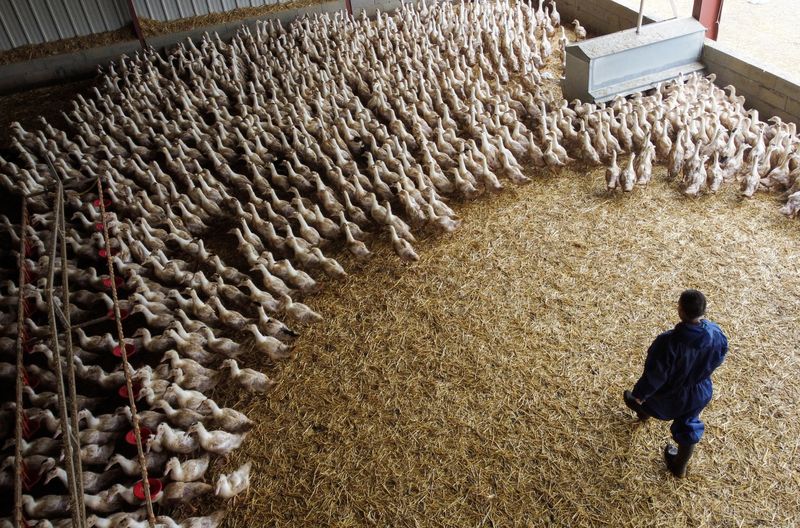By Jennifer Rigby
LONDON (Reuters) - Some of the world's leading makers of flu vaccines say they could make hundreds of millions of bird flu shots for humans within months if a new strain of avian influenza ever jumps across the species divide.
One current outbreak of avian flu known as H5N1 clade 2.3.4.4b has killed record numbers of birds and infected mammals. Human cases, however, remain very rare, and global health officials have said the risk of transmission between humans is still low.
Executives at three vaccine manufacturers – GSK Plc Moderna (NASDAQ:MRNA) Inc and CSL (OTC:CSLLY) Seqirus, owned by CSL Ltd - told Reuters they are already developing or about to test sample human vaccines that better match the circulating subtype, as a precautionary measure against a future pandemic.
Others, like Sanofi (NASDAQ:SNY), said they "stand ready" to begin production if needed, with existing H5N1 vaccine strains in stock.
There has also been a push among companies to develop a bird flu vaccine for poultry, a market potentially far larger than that for humans.
Less reassuring, however, is that most of the potential human doses are earmarked for wealthy countries in long-standing preparedness contracts, global health experts and the companies said.
Many countries' pandemic plans say flu shots should go first to the most vulnerable while supply is limited. But during COVID-19, many vaccine-rich countries inoculated large proportions of their populations before considering sharing doses.
"We could potentially have a much worse problem with vaccine hoarding and vaccine nationalism in a flu outbreak than we saw with COVID,” said Dr Richard Hatchett, chief executive of the Coalition for Epidemic Preparedness Innovations (CEPI), which helps fund vaccine research.
An international framework for pandemic flu allocates 10% of global supply for the World Health Organization to share with low- and middle-income countries. By contrast, the WHO is seeking guarantees of 20% global supply for other types of pandemic in the wake of COVID.
The U.N. agency said it has signed legally binding agreements with 14 manufacturers for 10% of their pandemic flu vaccine “as it comes off the production line", in a mix of donated doses and doses to be bought by the agency at an affordable price. The agreements include six of the largest seasonal flu manufacturers, such as GSK, Sanofi and CSL Seqirus, the WHO said.
WHO did not comment on the potential for vaccine hoarding in a flu pandemic but said mechanisms were being developed “so that countries can work together – not in competition with each other” to respond to such a crisis. It said it was “fully confident” manufacturers and member states would meet their obligations.
NEW APPROACHES
In a pandemic, vaccine manufacturers would shift production of seasonal flu vaccines and instead make shots tailored to the new outbreak when needed. They already have the capacity to make hundreds of millions of doses.
Many of the potential pandemic shots are pre-approved by regulators, based on data from human trials showing the vaccines are safe and prompt an immune response, a process already used with seasonal flu vaccines. This means they might not require further human trials, even if they have to be tweaked to better match whichever strain does jump to humans. Data on how well the vaccines actually protect against infection would be gathered in real-time.
In all, the WHO said there are close to 20 licensed vaccines against the broader H5 strain of flu. Existing antiviral treatments for people already infected will also help mitigate the impact.
At the same time, moving to large-scale production of a more targeted shot could take months, the manufacturers said. Some potential shots use a traditional method, growing the virus used in the vaccines in chicken eggs over four to six months.
“Creating the first dose is the easiest,” said Raja Rajaram, head of global medical strategy at CSL Seqirus. “The hardest is manufacturing in large quantities.”
Experts have long advocated for new approaches in developing vaccines, both for seasonal and pandemic flu. COVID proved the potential of mRNA technology to adapt more quickly to changing viruses because the vaccines use genetic information from the pathogen, rather than having to grow the virus itself.
Moderna’s mRNA vaccine research actually began with pandemic flu, and was modified for COVID, said Raffael Nachbagauer, executive director of infectious diseases at Moderna.
The company plans to launch a small human trial of an mRNA pandemic flu vaccine tailored to the new avian influenza subtype in the first half of 2023, he said, adding Moderna could respond “very quickly” in an outbreak scenario. The results will be closely watched, as the data on Moderna’s seasonal flu candidate was mixed.

Nachbagauer said the company was mindful of the equity issue needing to be addressed but has no contracts yet.
“It would be premature to sign anything or commit to anything that we can’t actually deliver on as of today,” he said.